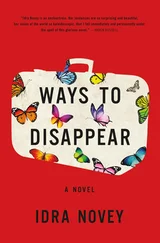Then it’s my in-laws’ turn.
“Is it possible he might do something to himself?” Vibeke asks.
I hesitate too long, and Thorkild has to take the receiver. “We’re coming over there now,” he says.
“I’d rather you wait. If I don’t find him in the next half hour, I’ll call you again.”
Back to the yard. I shout his name and get no answer.
And just then — at the same time that I’m searching and calling and feeling desperate — just then, it’s not simply despair I feel. What was it that Ulla said at my first support group meeting? It would have been better if Kirsten’s husband had died this time . The group smiled afterward; we all felt a bond.
I run down the wooded path toward the lakeshore. No sign of him on the small pier that extends from the woods out into the water.
Thorkild calls again. I tell him they should wait another hour before they come, but he says they’re already in the car and on their way.
I call the police. They haven’t heard anything.
Vibeke calls again from the car, and while I have my weeping mother-in-law on the phone, I hear the beep of another incoming call. I hang up and suddenly Laust is on the line. “Will you come and get your husband!”
“He’s at your place?”
“He just shoved his way in, and I can’t get him to leave.”
Relief. And then not, after all. What was it Ulla said? And everyone smiled. I’m relieved. I am relieved.
I picture Frederik standing erect and sobbing in Laust and Anja’s classy Copenhagen home, his thin body amid their vintage furniture of Swedish birch, with its lovely patinated stain. The moose in the forest.
“May I speak to him?” I ask.
He comes on the line, but he isn’t crying. “There’s nothing to say,” he says in a pinched voice before falling silent. He sounds like a lonesome hero in an old western.
“But you’re not going to leave?”
“No.”
“You have to. It’s Laust’s apartment.”
“It’s him who needs to talk to me. There are two of us. He’s being so unconstructive.”
“How did you get all the way over there?”
The receiver’s torn from his hand and Laust is back. “I’m calling the police if he isn’t out of here in two minutes.”
I try to convince Laust to wait and I run back to the house and car. Once I’m on the freeway I call Niklas and then Thorkild and Vibeke, who are headed toward me on the same road.
Frederik and I have been to lots of parties and dinners in Laust and Anja’s apartment, which lies a few hundred yards from Saxtorph. I know where everything is, in their rooms and kitchen cabinets. I know which photos of their kids hang by the door in the living room and which ones hang in their bedroom. I know the reflection of the window onto the long white dinner table, and the bookcases with Anja’s blue-grey folders of teaching materials for her gymnasium English classes. And I know, from one of the few Saxtorph teachers who side with us, that Laust and Anja have to move. The board’s personally responsible for the school’s finances — something that nobody gave much thought to because the finances were always rock-solid, but now four of the board members have to sell their homes.
All my life, whenever I’ve encountered men who are grieving, I’ve observed a certain restlessness in my body. Unhappy women weep and talk and spew their sorrow over everything. Grieving men, on the other hand, shuffle dumbly about and seal up all the chinks in their houses until they’re ready to gas themselves or ignite some catastrophe for whoever happens to be nearby. They commit suicide and murder and monstrosity, while we only make sobbing attempts that aren’t really meant to succeed. The grief of men is a vast, silent world that’s never revealed itself to me.
And yet I may be starting to understand a little anyway. These last few days in bed, as I’ve finally begun to glimpse my new future, my eyes have been completely dry.
• • •
Laust opens the great carved oak door of his and Anja’s apartment. He looks just as I expected, his pale round head bleak and brooding. And Frederik, standing in the hall behind him, looks the same way. Not a peep. There’s nothing to suggest that they’ve been talking to each other at all.
I don’t know what to say to Laust, who until a few months ago was one of my best friends. Now I don’t even want to talk to Frederik in front of him. Lacking a better alternative, I decide to be like the men: I hold my tongue and look annoyed. The three of us proceed silently into the large corner living room, with its stucco ceiling and the view over Saint Thomas Square. Then we just stand there.
FOR SALE signs block part of the windows. Several of the old paintings are gone; perhaps Laust and Anja had to sell them. The ceramic bowl I picked out for Anja’s fortieth, as a gift from us and some friends we had in common, is also gone from the dinner table, though probably not to be sold.
Why is Laust home in the middle of the day? Is he on sick leave?
At last Frederik speaks up. “You change your accounting methods the way I’ve told you; you sell the gym, and the other premises that we rent out after school hours, to an independent firm, and the school can lease them back during the school day.”
He speaks quickly and coolly, summarizing something he’s evidently already been arguing for.
“You contact the sixteen parents of former students whose names I wrote down on that list. You speak with Aksel at the bank about dealing directly with him and Jørgen— not with Anette on any account. And I’ll e-mail you the letter for the Friends of Saxtorph.”
He can sound so persuasive. If anyone can rescue the school, it’s him of course.
I find myself blurting out, “Is this a plan, Frederik?” I turn toward Laust. “Is that what it is? A plan?”
“Naturally, we’ve tried everything like that,” he mumbles, not looking me in the eye. “We aren’t idiots.”
Frederik’s agitated, but it might not be just his illness, since he’s also dedicated his life to the school. “That’s not true!” he shouts. “I talked to Kim yesterday, and he hasn’t heard from you!”
Laust finally raises his voice too, and it’s as if I needed him to. “We’ve tried everything. Everything! To save us from all the shit you dumped on us! The party’s over, like I’ve told you a hundred times.”
“You haven’t talked to Kim! Have you talked to anyone else on the list I gave you? They’re precisely the people you should be talking to.”
Something now about how to position myself — body language and facial expression — I should show that I’m backing up my husband. Or should I? Should it be the opposite — should I show Laust that I know Frederik’s a nut the two of us have to appease?
Laust enters a short number on his phone, no doubt the police. “Your coming here didn’t do much good, eh Mia?”
Frederik continues, undeterred. “It has to be them . All sixteen.”
I don’t know if I should step toward Laust, or back, or … “Laust, will you let me talk to him alone? Two minutes?”
He doesn’t answer, just turns his back on me and puts his phone in his pocket. He’s giving me a chance.
After Laust has gone out in the hall to the kitchen, I slowly get Frederik to sit down on the sofa, seated at my side. He’s still worked up; I hold his hand. “Frederik, what’s this plan?”
“I’ve figured out how we can rescue the school.”
Laust sticks his head back in the room. “Mia, I’m holding you responsible if he smashes anything.”
Then he’s gone again.
Assuming my gentlest voice, I ask, “Why didn’t you just ask to call Laust and suggest your plan on the phone? Wouldn’t that have been a lot easier?”
Читать дальше



![Ally Carter - [Gallagher Girls 01] I'd Tell You I Love You But Then I'd Have to Kill You](/books/262179/ally-carter-gallagher-girls-01-i-d-tell-you-i-lo-thumb.webp)








